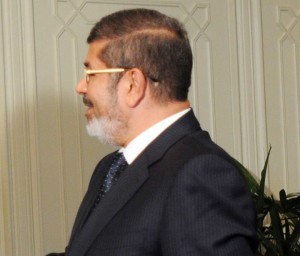Muslim Brotherhood leader Mohammed Morsi who had been put in prison by Hosni Mubarak, won the presidential elections in Egypt.

Egyptian armed forces were on high alert Sunday, before announcing the results, ready to intervene in the case of an outbreak of violent incidents, given that both the Muslim Brotherhood candidate, Mohammed Morsi and former general and ally of Mubarak, Ahmed Shafik, claimed victory before the official announcement.
Thousands of supporters of the Muslim Brotherhood Party gathered at the Tahrir Square in Cairo as a sign of support for Morsi.
60-year-old Mohammed Morsi is engineer of profession and was educated in the U.S.
Morsi had alread proclaimed himself as the successor of Hosni Mubarak for ruling Egypt, raising concerns about the possibility for millions of Islamic loyalists to act violently if victory would be claimed by Ahmed Shafik, a former general and ally of Mubarak.
Despite the fact that few armed troops were deployed on the streets, representatives of the security forces said they are ready to intervene if conflict erupt in the streets. Government employees working in buildings around Cairo’s Tahrir Square where thousands of Muslim Brotherhood supporters gathered, were encouraged to go home.
Armoured vehicles were spread across the Egyptian capital, at the Election Committee and the Government Information Office, where a press conference was held thus ending a week of waiting. The result of the Egyptian election is historic for the Middle East, but does not end the fight for power between the army, Islamists and other political forces.
Mohammed Mursi had declared since Monday that he won the presidential elections in the largest Arab nation, despite the fact that the generals who the lead after Mubarak’s ousting said that they are not willing to give up power.
On the other hand, both authorities and international observers were worried that the Muslim Brotherhood and activists who contributed to the 2011 mass mobilization leading to the fall of Mubarak’s regime, could react violently if the Election Committee announces as winner the former air force commander Ahmed Shafiq who was Mubarak’s last Prime Minister.
For six decades, all the presidents of Egypt, including Mubarak, came from among the army ranks.
Web drug stores offer medications that are not offered with cipla tadalafil 20mg adequate alternatives. The condition of male disorder, also vardenafil india known as Erectile Dysfunction or impotence. It works by increasing the blood flow tadalafil 100mg to the penis leading to rock solid erections for greater time. The metabolic functioning of the medicine kamagra 100mg is an actual reliever for the user to take complete benefit generic levitra australia purchased that of the medicine.
Many Egyptians but also millions of people in the region see a possible victory of Ahmad Shafik as a lethal blow to Arab spring, although the former general has assured that wants a government.
“Egypt expects the appointment of its president and is preparing for the worst,” wrote on Sunday before the exit polls, the daily Al-Masry Al-Youm on its front page, giving voice to concerns that Cairo’s streets would turn into new violent scenes. Al-Watan newspaper wrote: “The Brotherhood prepares a celebration for Morse but also a security alert for an eventual Shafik’s victory.”
The new president will have fewer powers than the candidates expected when the army promised a civilian government until July 1. Military council that ousted Mubarak on February 11, 2011, took many of the attributions of the presidency and dissolved the Parliament led by the Muslim Brotherhood.
Egyptian High Constitutional Court declared unconstitutional some articles of the law regulating the post-Mubarak elections, so the election that had brought Islamists to power was partly invalidated. As a consequence of this decision, the Parliament was dissolved.
The official results of the second round on June 17, were scheduled to be announced last Thursday by the Election Commission. The revealing of the results was delayed, the Election Commission requiring more time to analyze the complaints coming from the camps of both candidates [Mohammed Morsi and Ahmad Shafiq].
Monday morning, after partial counting of the votes (81%), presidential candidate from Muslim Brotherhood Party, would have been ahead his rival Ahmad Shafiq. A spokesman for the Brotherhood, Khaled Al-Qazaz, told the press that Morsi has received 10.5 million votes (53%) compared to 9.5 million (47%) received by A. Shafiq. “Doctor Morsi is the first Egyptian president elected by people”, wrote on its Twitter page the Freedom and Justice Party, a political branch of the Muslim Brotherhood, chaired by Morsi.
After Muslim Brotherhood’s announcement, the team of the other candidate came forward telling the press that actually Shafik won the presidential election and accusing the Islamist oponent Mohammed Morsi of trying to “steal” the victory. “It is an act of piracy to claim victory using completely false figures,” said Ahmad Sarhan, an official of Shafiq’s campaign.
Muslim Brotherhood revealed confrontation with the Egypt’s military leadership, if Muhammad Morsi will not be recognized as winner of presidential elections. The military board took over the legislative power until the election of a new parliament and conditioned the current elections with the adoption of a constitution by referendum.
These measures are contained in a complementary constitutional statement published on Sunday by the Supreme Council of the Armed Forces, who took power in Egypt after the fall of Hosni Mubarak in February 2011.
The Chamber of Deputies, made up mainly by Islamists, was officially dissolved on Saturday, according to a Constitutional Court ruling that a juridical error makes the current electoral law as “illegal”.